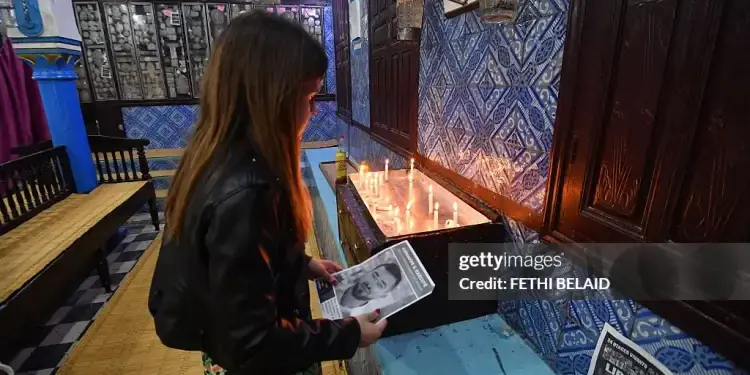Each year, the Ghriba synagogue, on the island of Djerba, welcomes hundreds of Jewish pilgrims, who came to celebrate in a spirit of peace and spirituality. But this year, a detail has crystallized attention far beyond religious rituals: the display of photos of Israeli hostages held by Hamas, accompanied by the slogan “Bring Them Home Now”, provoked lively controversy in Tunisia.
Images of pilgrims holding portraits of hostages – civilians or members of the Israeli forces – have circulated on social networks and in the international press, creating discomfort in a Tunisian society already sensitive to the Palestinian question.
For many observers, this gesture has introduced a political element into a place of worship supposed to remain neutral. The slogan “Bring Them Home Now”, created by families of Israeli hostages, goes beyond a simple humanitarian call: its official website qualifies Hamas “terrorist movement” and claims to want to “continue its members for war crimes and crimes against humanity”.
A message perceived as problematic, especially in a country where the Palestinian cause benefits from strong popular support and where public opinion remains very critical of the military actions of Israel.
In a remarkable publication on social networks, the Tunisian journalist Bassem Bounani expressed his indignation:
“The Jews of Tunisia have the right to practice their worship in complete freedom, with the protection of the authorities if necessary. But I also have the right, as a citizen, to know who authorized the exhibition of photos of an occupation army police killed on October 7, 2023, as well as Zionist hostages held by Hamas, during the pilgrimage to Ghriba. This position has nothing to do with the official position of the State, or with that of the people, or with the synagogue as a place of worship. »»
A confusion of spaces
Controversy is based on a fundamental distinction: that between religious practice, which must be protected and respected, and political expression, which, in such a sensitive context, can cause tensions. The risk is great to see Ghriba, in spite of itself, a space instrumentalized for causes foreign to worship, thus exposing the Jewish community of Tunisia to undesirable controversies.
For the State, guaranteeing the security of the pilgrimage while avoiding political overflows becomes a balancing exercise. It is a question of respecting the protection commitments of religious minorities while taking into account popular sensitivity to the Israeli-Palestinian conflict.
The current controversy around the photos of Israeli hostages highlights a persistent tension between religious freedom, neutrality of places of worship and political perception of the symbols displayed. It also questions the responsibility of the organizers and the authorities in terms of framing the religious demonstrations welcomed on Tunisian soil.








